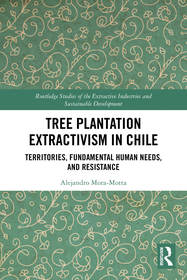
Tree Plantation Extractivism in Chile
Territories, Fundamental Human Needs, and Resistance
Series: Routledge Studies of the Extractive Industries and Sustainable Development;
- Publisher's listprice GBP 42.99
-
20 538 Ft (19 560 Ft + 5% VAT)
The price is estimated because at the time of ordering we do not know what conversion rates will apply to HUF / product currency when the book arrives. In case HUF is weaker, the price increases slightly, in case HUF is stronger, the price goes lower slightly.
- Discount 10% (cc. 2 054 Ft off)
- Discounted price 18 484 Ft (17 604 Ft + 5% VAT)
Subcribe now and take benefit of a favourable price.
Subscribe
20 538 Ft

Availability
Estimated delivery time: In stock at the publisher, but not at Prospero's office. Delivery time approx. 3-5 weeks.
Not in stock at Prospero.
Why don't you give exact delivery time?
Delivery time is estimated on our previous experiences. We give estimations only, because we order from outside Hungary, and the delivery time mainly depends on how quickly the publisher supplies the book. Faster or slower deliveries both happen, but we do our best to supply as quickly as possible.
Product details:
- Edition number 1
- Publisher Routledge
- Date of Publication 30 July 2025
- ISBN 9781032491875
- Binding Paperback
- No. of pages270 pages
- Size 234x156 mm
- Weight 500 g
- Language English
- Illustrations 18 Illustrations, black & white; 11 Halftones, black & white; 7 Line drawings, black & white; 10 Tables, black & white 683
Categories
Short description:
This book examines how extractivism transforms territories and affects the well-being of rural people, drawing on in-depth fieldwork conducted on tree plantations in Chile.
MoreLong description:
This book examines how extractivism transforms territories and affects the well-being of rural people, drawing on in-depth fieldwork conducted on tree plantations in Chile.
The book argues that pine and eucalyptus monoculture plantations in southern Chile are a form of extractivism representing a mode of nature appropriation that captures large amounts of natural resources to produce wooden-based raw materials with little processing and an export-oriented focus. The book discusses the nexus of extractivism, territorial transformations, well-being, and emerging resistances using a participatory action research methodological approach in the Region of Los Ríos, southern Chile. The findings show how the configuration of an extractivist logging enclave generated a substantial and irrevocable reordering of human-nature relations, resulting in the territorial and ontological occupation of rural places that disrupted the fundamental human needs of peasants and indigenous people. The book maintains that Chile's green growth development approach does not challenge the consolidated tree plantation enclave controlled by large multinationals. Instead, green growth legitimises the extractivist logic. The book draws parallels with other countries and regions to contribute to wider debates surrounding these topics.
This book will be of great interest to students and scholars of the extractive industries, development studies, political ecology, and natural resource governance.
MoreTable of Contents:
1. Introduction
2. The making of a logging enclave
3. Extractivisms, territorial transformation, and well-being alternatives in Latin America
4. Tree plantations and territorial transformation in rural La Unión
5. Living within tree plantations: fundamental human needs in a transformed territory
6. Emerging resistances and territorial planning in Los Ríos
7. Conclusion
8. Annexe
More




